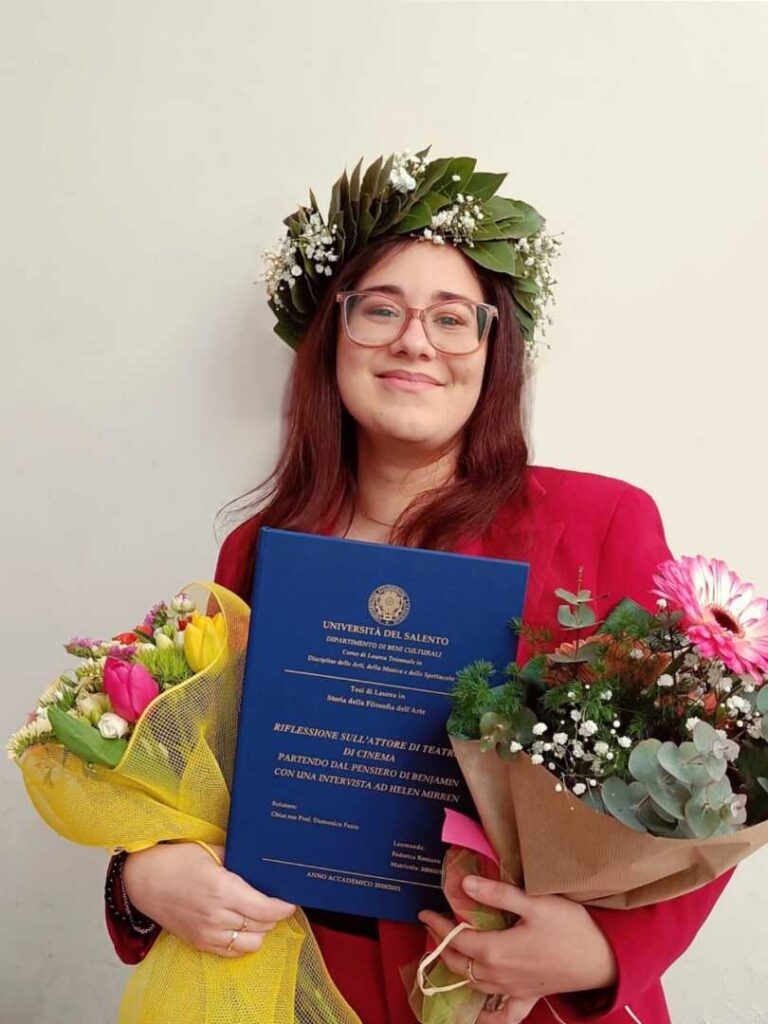 (AGENPARL) - Roma, 2 Maggio 2022
(AGENPARL) - Roma, 2 Maggio 2022(AGENPARL) – lun 02 maggio 2022 Piazza Tancredi, 7
UFFICIO I 73100 Lecce
COMUNICATO STAMPA
DAMS, TESI DI LAUREA CON PREMIO OSCAR
FEDERICA ROMANO HA INTERVISTATO L’ATTRICE HELEN MIRREN
PER IL SUO LAVORO DI FINE PERCORSO SUL MESTIERE DELL’ATTORE
Emozione doppia per Federica Romano che, alla soddisfazione di aver
raggiunto il traguardo della laurea, somma l’onore di aver potuto intervistare per
la sua tesi, in esclusiva, l’attrice Helen Mirren, alla quale nei mesi scorsi è stato
conferito il titolo di Ambasciatrice dell’Università del Salento. “Riflessioni
sull’attore di teatro e di cinema a partire da Walter Benjamin” è l’argomento del
lavoro di fine corso presentato nelle scorse settimane a UniSalento, dove
Federica Romano ha conseguito la laurea triennale in Discipline delle arti, della
musica e dello spettacolo (Dams); relatore il professor Domenico Fazio,
docente di Storia della Filosofia.
La tesi, impreziosita appunto dalla testimonianza dell’attrice premio Oscar
per l’interpretazione in “The queen”, ha indagato il mestiere dell’attore, con un
focus sulle somiglianze e le differenze tra la recitazione teatrale e quella
cinematografica, nel solco degli studi del filosofo tedesco Walter Benjamin
sull’unicità e riproducibilità dell’opera d’arte. Mirren ha iniziato la sua brillante
carriera da attrice con il teatro, si è formata come interprete shakespeariana
ottenendo importanti successi sulle scene teatrali inglesi e americane. Le tracce
di questa formazione sono percepibili nella sua maniera di recitare per il grande
schermo, pertanto la sua testimonianza è stata un contributo importante per
comprendere cosa significhi abbracciare i due tipi di recitazione.
«La signora Mirren era sul set di un film», racconta Federica Romano,
«Perciò ricevere le sue risposte è stata una grande emozione, un vero onore. Le
sono immensamente grata. Le sue autorevoli parole hanno accresciuto il valore
dell’elaborato, trasformando una cosa importante come la tesi di laurea in
qualcosa di indimenticabile».
Di seguito la breve intervista realizzata per la tesi.
Lecce, 2 maggio 2022
Piazza Tancredi, 7
UFFICIO I 73100 Lecce
L’intervista di Federica Romano all’attrice Helen Mirren
1. What is the difference between acting for the stage and acting for the
screen?
While undoubtedly film acting is extremely technical, and the performance
is generally delivered in small fractions, which are not in the sequence of the
story, the actual moment of performance is as true as a “live” performance. The
advantage is that the performance can be much closer to the reality of life as
there is no need to communicate with a large number of people in a theatre.
1. Qual è la differenza tra la recitazione per il palcoscenico e quella per lo
schermo?
Anche se, indubbiamente, la recitazione cinematografica è estremamente
tecnica, e la performance è generalmente consegnata in piccole frazioni, che non
sono nella sequenza della storia, il momento reale della performance è vero
come se fosse “live”. Il vantaggio è che la performance può essere molto più
vicina alla realtà della vita in quanto non c’è bisogno di comunicare con un gran
numero di persone in un teatro.
2. In “The Work of Art in the Age of Mechanical Reproduction” (1936), the
philosopher Walter Benjamin wrote about the aura of the objet d’art (the
authenticity and uniqueness of a work of art). With the beginning of the
Mechanical Reproduction Era, the work of art is easily technically reproduced.
The (theatre) audience is replaced by the camera, therefore, actors lose their
aura and there’s a sort of alienation.
Do you think it’s true? Does acting in front of a camera make actors feel a
sense of isolation or alienation? What’s your experience?
The essence of the process of acting is the same for film or television. You
just use different tools. On stage your whole body language tells the story, on
film this is only the case in a long shot, in a closeup it does not matter what story
your hands are telling.
There is also a feeling of being more in control of the audience’s response
onstage. Many processes can alter a film performance: editing, music etc.
Also, the energy required for a stage performance is very different from a
film performance. In film the energy, and concentration has to be found over a
long day, usually 12 hours, of longer followed by short very intense performance.
On stage the energy and emotional commitment is continuous over 2-3
hours. In fact, to do a stage performance is far more physically and emotionally
demanding than film, in my personal experience.
2. In “L’opera d’arte nell’epoca della sua riproducibilità tecnica” (1936), il
filosofo Walter Benjamin ha scritto sull’aura dell’oggetto d’arte (l’autenticità e
l’unicità di un’opera d’arte). Con l’inizio dell’era della riproduzione meccanica,
l’opera d’arte è facilmente riproducibile tecnicamente. Il pubblico (teatrale) è
sostituito dalla telecamera, quindi gli attori perdono la loro aura e c’è una sorta
di alienazione.
Piazza Tancredi, 7


